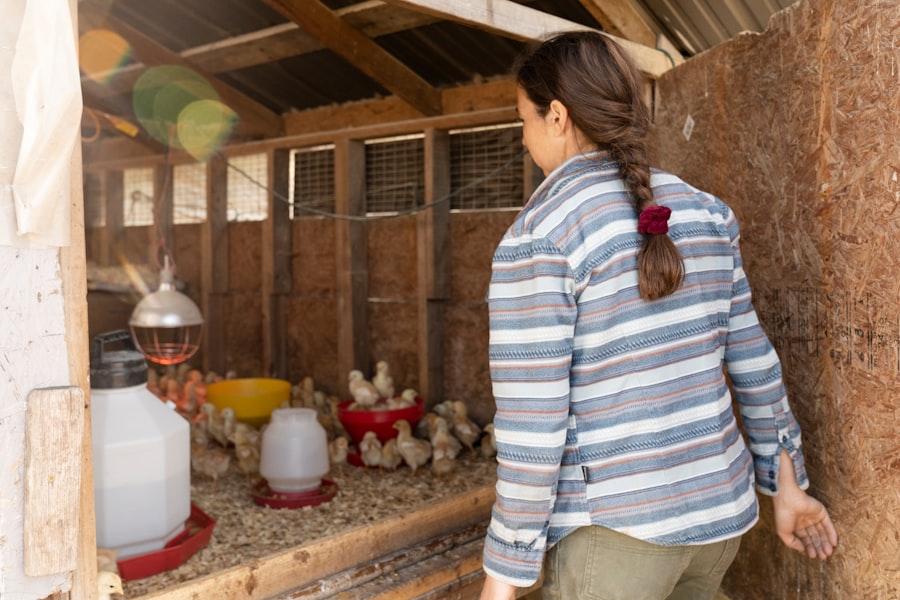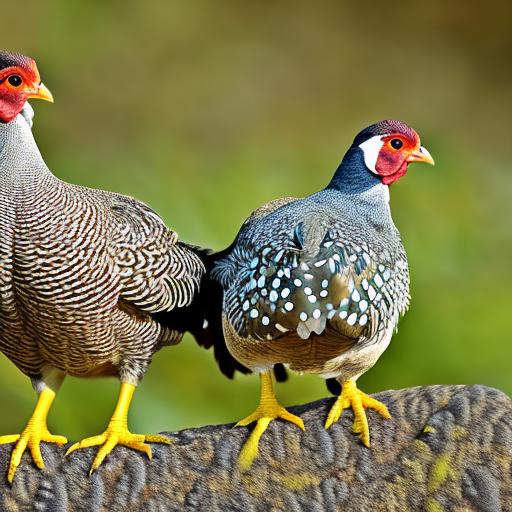Keeping chickens and guinea fowl together can be a rewarding experience for poultry enthusiasts. Both chickens and guinea fowl are popular choices for backyard flocks due to their ability to provide eggs, pest control, and entertainment. While they have some similarities, such as their omnivorous diets and ability to forage, they also have distinct differences in terms of behavior, housing needs, and nutritional requirements. Understanding these differences is crucial for successfully integrating chickens and guinea fowl into a mixed flock. This article will explore the considerations for keeping chickens and guinea fowl together, including housing, feeding, health management, and behavioral considerations.
Key Takeaways
- Chickens and guinea fowl can be kept together, but it’s important to understand their differences and specific needs.
- Guinea fowl are more independent and prefer to roost in trees, while chickens are more social and prefer to roost in a coop.
- When housing chickens and guinea fowl together, provide separate areas for roosting and nesting to accommodate their different preferences.
- Both chickens and guinea fowl require a balanced diet of grains, greens, and protein, but guinea fowl have higher protein requirements.
- Regular health checks, proper hygiene, and monitoring for signs of disease are essential for maintaining the well-being of mixed flocks.
Understanding the Differences Between Chickens and Guinea Fowl
Chickens and guinea fowl belong to different species and have distinct characteristics that set them apart. Chickens are domesticated birds that come in various breeds, each with its own unique traits such as egg-laying abilities, temperament, and size. They are known for their social nature and can be quite docile when raised in a friendly environment. On the other hand, guinea fowl are wild birds that have been partially domesticated. They are known for their loud calls, excellent foraging abilities, and alert nature. Guinea fowl are more independent and can be skittish compared to chickens. Additionally, guinea fowl are known for their strong flocking instincts and may exhibit aggressive behavior towards unfamiliar birds or predators. Understanding these differences is important when considering the compatibility of chickens and guinea fowl in a mixed flock.
Considerations for Housing Chickens and Guinea Fowl Together
When housing chickens and guinea fowl together, it is important to consider the space requirements, roosting preferences, and predator protection for both species. Chickens typically prefer to roost off the ground at night, while guinea fowl have a preference for higher roosting spots such as trees or elevated perches. Providing multiple roosting options in the coop can help accommodate the different preferences of chickens and guinea fowl. Additionally, ensuring that the coop and run are secure from predators such as foxes, raccoons, and birds of prey is essential for the safety of both chickens and guinea fowl. It is also important to provide ample space for both species to roam and forage, as overcrowding can lead to stress and aggression within the flock. By considering the housing needs of both chickens and guinea fowl, poultry keepers can create a harmonious living environment for their mixed flock.
Feeding and Nutrition for Chickens and Guinea Fowl
Feeding a mixed flock of chickens and guinea fowl requires careful consideration of their nutritional needs. While both species are omnivorous and enjoy foraging for insects, plants, and seeds, they have different dietary requirements. Chickens require a diet high in protein to support egg production, while guinea fowl have a higher need for protein to support their active foraging behavior. Providing a balanced feed that meets the nutritional requirements of both chickens and guinea fowl is essential for their health and productivity. Additionally, offering supplemental treats such as mealworms, fruits, and vegetables can help satisfy their natural foraging instincts and provide enrichment. It is important to monitor the feeding behavior of both species to ensure that all birds have access to adequate nutrition without competition or aggression at the feeder. By understanding the feeding and nutritional needs of chickens and guinea fowl, poultry keepers can promote the overall health and well-being of their mixed flock.
Managing Health and Disease in Mixed Flocks
Maintaining the health of a mixed flock of chickens and guinea fowl requires proactive management to prevent disease and address any health concerns that may arise. Both species are susceptible to common poultry diseases such as respiratory infections, parasites, and nutritional deficiencies. Regular health checks, proper sanitation practices, and access to clean water are essential for preventing disease in a mixed flock. Additionally, providing a well-ventilated coop, regular deworming, and access to dust baths can help mitigate the risk of respiratory infections and external parasites. It is important to observe the behavior and appearance of both chickens and guinea fowl for any signs of illness or distress, as early detection is key to effective treatment. Working with a veterinarian experienced in poultry care can provide valuable guidance on disease prevention and treatment options for mixed flocks. By implementing proactive health management practices, poultry keepers can promote the overall well-being of their chickens and guinea fowl.
Behavioral Considerations for Mixed Flocks

Understanding the behavioral differences between chickens and guinea fowl is crucial for managing a harmonious mixed flock. Chickens are known for their social nature and hierarchical structure within the flock, while guinea fowl have strong flocking instincts and are more independent in their behavior. Introducing new birds to the flock or integrating young chicks or keets requires careful observation to prevent aggression or bullying. Providing multiple feeding stations, roosting options, and ample space for both species to establish their territories can help minimize competition and aggression within the flock. Additionally, observing the natural behaviors of both chickens and guinea fowl, such as dust bathing, foraging, and vocalizations, can provide valuable insight into their well-being and social dynamics. By understanding the behavioral considerations of mixed flocks, poultry keepers can create a supportive environment that allows both chickens and guinea fowl to thrive.
Tips for Successfully Keeping Chickens and Guinea Fowl Together
Successfully keeping chickens and guinea fowl together in a mixed flock requires careful consideration of their housing, feeding, health management, and behavioral needs. Providing adequate space, secure housing, balanced nutrition, proactive health management, and understanding their behavioral differences are essential for creating a harmonious living environment for both species. By observing their natural behaviors, addressing their specific requirements, and promoting a supportive social structure within the flock, poultry keepers can enjoy the benefits of having a diverse and thriving mixed flock of chickens and guinea fowl. With proper planning and management, keeping chickens and guinea fowl together can be a rewarding experience that provides eggs, pest control, entertainment, and a deeper appreciation for these fascinating birds.
If you’re considering keeping chickens and guinea fowl together, it’s important to understand the dynamics between these two species. To ensure a harmonious cohabitation, it’s crucial to provide a suitable coop that meets the needs of both types of birds. For expert advice on creating the perfect coop for your feathered friends, check out the article “10 Essential Features for a Chicken Coop” on PoultryWizard.com. This comprehensive guide offers valuable insights into designing a coop that caters to the specific requirements of chickens and guinea fowl, promoting their well-being and peaceful coexistence.
FAQs
Can you keep chickens and guinea fowl together?
Yes, chickens and guinea fowl can be kept together in the same coop and run.
Do chickens and guinea fowl get along?
In general, chickens and guinea fowl can get along well if introduced properly and given enough space.
What are the benefits of keeping chickens and guinea fowl together?
Keeping chickens and guinea fowl together can help with pest control, as guinea fowl are known for eating insects and ticks. They can also provide companionship for each other.
Are there any drawbacks to keeping chickens and guinea fowl together?
One potential drawback is that guinea fowl can be noisy, which may disturb the chickens. Additionally, guinea fowl are more prone to wandering and may not stay as close to the coop as chickens.
What should I consider before keeping chickens and guinea fowl together?
Before keeping chickens and guinea fowl together, consider the space requirements, the temperament of the birds, and the potential noise level from the guinea fowl. It’s also important to provide separate nesting areas for each species.
Meet Walter, the feathered-friend fanatic of Florida! Nestled in the sunshine state, Walter struts through life with his feathered companions, clucking his way to happiness. With a coop that’s fancier than a five-star hotel, he’s the Don Juan of the chicken world. When he’s not teaching his hens to do the cha-cha, you’ll find him in a heated debate with his prized rooster, Sir Clucks-a-Lot. Walter’s poultry passion is no yolk; he’s the sunny-side-up guy you never knew you needed in your flock of friends!







